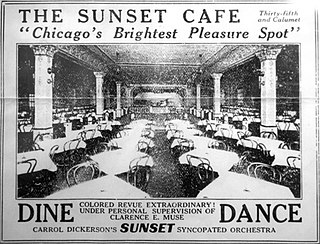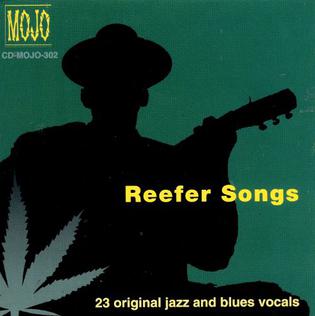| "Have You Ever Met That Funny Reefer Man" | |
|---|---|
| Single by Cab Calloway | |
| Released | 1932 |
| Genre | Jazz |
| Label | Columbia Records |
| Songwriter(s) | Andy Razaf |
| Composer(s) | J. Russel Robinson |
"Have You Ever Met That Funny Reefer Man", often known simply as "The Reefer Man", [1] is a 1932 American jazz song composed by J. Russel Robinson, [2] with lyrics by Andy Razaf. It was first recorded by Cab Calloway and his orchestra, [3] with versions by others over the years, including by Harlan Lattimore, Murphy's Law and Big Bad Voodoo Daddy. [4]
The song as performed by Calloway appears in the 1933 film International House . [5]
Snow-White is a 1933 American animated short in the Betty Boop series from Max Fleischer's Fleischer Studios. Dave Fleischer was credited as director, although virtually all the animation was done by Roland Crandall, who received the opportunity to make Snow-White on his own as a reward for his several years of devotion to the Fleischer studio. The resulting film, which took six months to complete, is considered both Crandall's masterwork and an important milestone of the Golden age of American animation.

Cabell Calloway III was an American jazz singer and bandleader. He was associated with the Cotton Club in Harlem, where he was a regular performer and became a popular vocalist of the swing era. His niche of mixing jazz and vaudeville won him acclaim during a career that spanned over 65 years.

Noble Lee Sissle was an American jazz composer, lyricist, bandleader, singer, and playwright, best known for the Broadway musical Shuffle Along (1921), and its hit song "I'm Just Wild About Harry".
"Minnie the Moocher" is a jazz-scat song first recorded in 1931 by Cab Calloway and His Orchestra, selling over a million copies. "Minnie the Moocher" is most famous for its nonsensical ad libbed ("scat") lyrics. In performances, Calloway would have the audience and the band members participate by repeating each scat phrase in a form of call and response, until making it too fast and complicated for the audience to replicate it.

International House is a 1933 American pre-Code comedy film starring Peggy Hopkins Joyce and W. C. Fields, directed by A. Edward Sutherland and released by Paramount Pictures. The tagline of the film was "The Grand Hotel of comedy". It is a mixture of comedy and musical acts tied together by a slim plot line, in the style of the Big Broadcast pictures that were also released by Paramount during the 1930s. In addition to some typical comedic lunacy from W. C. Fields and Burns and Allen, it provides a snapshot of some popular stage and radio acts of the era. The film includes some risqué pre-Code humor. The cast also features Cab Calloway with his orchestra and Bela Lugosi.

Reefer Madness is a 1936 American propaganda film about drugs, revolving around the melodramatic events that ensue when high school students are lured by pushers to try marijuana – upon trying it, they become addicted, eventually leading them to become involved in various crimes such as a hit and run accident, manslaughter, murder, conspiracy to murder and attempted rape. While all this is happening, they suffer hallucinations, descend into insanity, associate with organized crime and commit suicide. The film was directed by Louis J. Gasnier and featured a cast of mainly little-known actors.

Stormy Weather is a 1943 American musical film produced and released by 20th Century Fox, adapted by Frederick J. Jackson, Ted Koehler and H.S. Kraft from the story by Jerry Horwin and Seymour B. Robinson, directed by Andrew L. Stone, produced by William LeBaron and starring Lena Horne, Bill "Bojangles" Robinson, and Cab Calloway. The film is one of two Hollywood musicals with an African American cast released in 1943, both starring Lena Horne, the other being MGM's Cabin in the Sky. Stormy Weather is a primary showcase of some of the leading African American performers of the day, during an era when African American actors and singers rarely appeared in lead roles in mainstream Hollywood productions. The supporting cast features the Nicholas Brothers in arguably the screen's most bravura dance sequence, Fats Waller, Katherine Dunham and her dancers, and Dooley Wilson.

The Old Man of the Mountain is a 1933 American pre-Code live-action/animated short in the Betty Boop series, produced by Fleischer Studios. Featuring music by Cab Calloway and his Orchestra, the short was originally released to theaters on August 4, 1933 by Paramount Pictures. Calloway voices all of the characters in the cartoon save for Betty herself. Calloway and his orchestra also perform all of the music in the cartoon, including two songs Calloway co-wrote.

The Sunset Cafe, also known as The Grand Terrace Cafe, was a jazz club in Chicago, Illinois operating during the 1920s, 1930s and 1940s. It was one of the most important jazz clubs in America, especially during the period between 1917 and 1928 when Chicago became a creative capital of jazz innovation and again during the emergence of bebop in the early 1940s. From its inception, the club was a rarity as a haven from segregation, since the Sunset Cafe was an integrated or "Black and Tan" club where African Americans, along with other ethnicities, could mingle freely with white Americans without much fear of reprisal. Many important musicians developed their careers at the Sunset/Grand Terrace Cafe.
Swing Wedding is a 1937 MGM Happy Harmonies cartoon directed by Hugh Harman.
Cab Calloway's Hi-De-Ho is an American musical short film directed by Fred Waller and released by Paramount Pictures in 1934. The film stars jazz bandleader Cab Calloway and actress Fredi Washington. In 2001, the film was reissued by Kino International in the DVD collection Hollywood Rhythm: Vol. 1-The Best Of Jazz And Blues.
Cab Calloway's Jitterbug Party is a 1935 American musical short film which was released by Paramount Pictures. In 2001, the film was reissued by Kino International in the DVD collection Hollywood Rhythm: Vol. 1-The Best Of Jazz And Blues.
Albert Morgan was an American jazz double-bassist, who played with Cab Calloway and Fats Waller, among others. He also appeared in films such as The Gene Krupa Story, and played on records supporting the likes of Jack Teagarden and T-Bone Walker.

"Avalon" is a 1920 popular song written by Al Jolson, Buddy DeSylva and Vincent Rose referencing Avalon, California. It was introduced by Jolson and interpolated in the musicals Sinbad and Bombo. Jolson's recording rose to number two on the charts in 1921. The song was possibly written by Rose, but Jolson's popularity as a performer allowed him to claim composer co-credit. Originally, only Rose and Jolson were credited, and DeSylva's name was added later.

How Big Can You Get?: The Music of Cab Calloway is the sixth studio album released by Big Bad Voodoo Daddy. It features covers of songs by Cab Calloway.

"If You're a Viper" is a jazz song composed by Stuff Smith. It was first recorded by Smith and his Onyx Club Boys in 1936 and released as the b-side to the song "After You've Gone".
Jive talk, also known as Harlem jive or simply Jive, the argot of jazz, jazz jargon, vernacular of the jazz world, slang of jazz, and parlance of hip is an African-American Vernacular English slang or vocabulary that developed in Harlem, where "jive" (jazz) was played and was adopted more widely in African-American society, peaking in the 1940s.
"You Rascal You" is an American song written by Sam Theard in 1929, and legally titled "I'll Be Glad When You're Dead." The lyrics take the form of threats and complaints leveled against a man who has repaid the singer's hospitality and kindness by running off with the singer's wife.

Reefer Songs is a 1989 compilation album of jazz songs about drugs from the 1920s, 1930s, and 1940s. It features notable artists and musicians of the period, including Ella Fitzgerald, Chick Webb, Cab Calloway, Sidney Bechet and Benny Goodman. Although cannabis is the main drug cited here, cocaine, benzedrine (amphetamine) and heroin are also mentioned.

Minnie the Moocher is a 1932 Betty Boop cartoon produced by Fleischer Studios and released by Paramount Pictures.